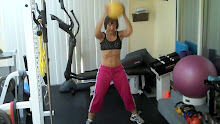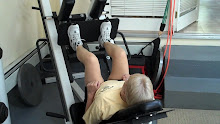Balsamic Chicken Breasts
Nutritional Information
Calories: 130 Carbohydrate: 6g Protein: 20g Fat: 4g
Ingredients4 (4-oz) chicken breasts, skinned and boneless 2 teaspoons extra-virgin olive oil 3small cloves garlic, pressed 8 oz fresh mushrooms, quartered 3 tablespoons balsamic vinegar ½ cup low-sodium chicken broth ½ teaspoon dried thyme, crushed Freshly ground black pepper to taste 1 chopped fresh parsley for garnish
Directions
Coat a 10-inch skillet with nonstick vegetable spray. Heat over medium heat. When hot, add chicken and cook until light brown, about 3 minutes on each side. Transfer chicken to a plate. Add olive oil to pan, sauté garlic and mushrooms briefly, being careful not to burn garlic. Return chicken to pan, add vinegar, chicken broth, thyme and pepper. Reduce heat, cover and simmer for 15 minutes or until chicken is cooked. Juices will run clear when meat is pierced in its thickest part with a fork. Transfer to serving dish and top chicken with mushrooms and pan sauce. Sprinkle with chopped parsley.
Friday, October 30, 2009
Saturday, October 10, 2009
Beneficial effects of exercise
If anyone is interested in reviewing current research here’s another one on aerobic exercise.
The study took 58 people doing just aerobics, (slow cardio) 5 days per week for 12 weeks (burning 500 calories per session). The average weight loss over the 12 weeks was 7lbs (there was a huge variance). But almost half (26 of the 58) who did participant only lost 1-2lbs over the entire 12 weeks. Again, 3 months of “aerobics only” produced limited results (not the way to go).
But on the positive side –HEALTH ---yes this type of training is “heart healthy” and is very beneficial in that regard.
This study confirms that steady state aerobic exercise is not the way to train if your goal is fat loss and body composition change, there are better methods for training (resistance training, intervals, bootcamp).
(Thanks to Craig Ballantyne for publishing this study)
**Br J Sports Med. 2009 Sep 29.Beneficial effects of exercise: shifting the focus from body weight to other markers of health.
King N, Hopkins M, Caudwell P, Stubbs J, Blundell J.
QUT, Australia;
BACKGROUND: Exercise is widely promoted as a method of weight management, whilst the other health benefits are often ignored. The purpose of this study was to examine whether exercise-induced improvements in health are influenced by changes in body weight.
METHODS: Fifty-eight sedentary overweight/obese men and women (BMI 31.8 +/-4.5kg/m2) participated in a 12 week supervised aerobic exercise intervention (70% heart rate max, 5 times a week, 500kcal per session). Body composition, anthropometric parameters, aerobic capacity, blood pressure and acute psychological response to exercise were measured at weeks 0 and 12.
RESULTS: Mean reduction in body weight was -3.3 +/-3.63kg (P<0.01). However, 26 of the 58 participants failed to attain the predicted weight loss estimated from individuals' exercise-induced energy expenditure. Their mean weight loss was only -0.9 +/-1.8kg (P<0.01). Despite attaining lower than predicted weight reduction, these individuals experienced significant increases in aerobic capacity (6.3 +/-6.0ml.kg-1.min-1; P<0.01), decreased systolic (-6.00 +/-11.5mmHg; P<0.05) and diastolic blood pressure (-3.9 +/-5.8mmHg; P<0.01), waist circumference (-3.7 +/-2.7cm; P<0.01) and resting heart rate (-4.8+/-8.9bpm, p<0.001). In addition, these individuals experienced an acute exercise-induced increase in positive mood.
CONCLUSIONS: These data demonstrate that significant and meaningful health benefits can be achieved even in the presence of lower than expected exercise-induced weight loss. Less successful reduction in body weight does not undermine the beneficial effects of aerobic exercise.
From a public health perspective, exercise should be encouraged and the emphasis on weight loss reduced.
The study took 58 people doing just aerobics, (slow cardio) 5 days per week for 12 weeks (burning 500 calories per session). The average weight loss over the 12 weeks was 7lbs (there was a huge variance). But almost half (26 of the 58) who did participant only lost 1-2lbs over the entire 12 weeks. Again, 3 months of “aerobics only” produced limited results (not the way to go).
But on the positive side –HEALTH ---yes this type of training is “heart healthy” and is very beneficial in that regard.
This study confirms that steady state aerobic exercise is not the way to train if your goal is fat loss and body composition change, there are better methods for training (resistance training, intervals, bootcamp).
(Thanks to Craig Ballantyne for publishing this study)
**Br J Sports Med. 2009 Sep 29.Beneficial effects of exercise: shifting the focus from body weight to other markers of health.
King N, Hopkins M, Caudwell P, Stubbs J, Blundell J.
QUT, Australia;
BACKGROUND: Exercise is widely promoted as a method of weight management, whilst the other health benefits are often ignored. The purpose of this study was to examine whether exercise-induced improvements in health are influenced by changes in body weight.
METHODS: Fifty-eight sedentary overweight/obese men and women (BMI 31.8 +/-4.5kg/m2) participated in a 12 week supervised aerobic exercise intervention (70% heart rate max, 5 times a week, 500kcal per session). Body composition, anthropometric parameters, aerobic capacity, blood pressure and acute psychological response to exercise were measured at weeks 0 and 12.
RESULTS: Mean reduction in body weight was -3.3 +/-3.63kg (P<0.01). However, 26 of the 58 participants failed to attain the predicted weight loss estimated from individuals' exercise-induced energy expenditure. Their mean weight loss was only -0.9 +/-1.8kg (P<0.01). Despite attaining lower than predicted weight reduction, these individuals experienced significant increases in aerobic capacity (6.3 +/-6.0ml.kg-1.min-1; P<0.01), decreased systolic (-6.00 +/-11.5mmHg; P<0.05) and diastolic blood pressure (-3.9 +/-5.8mmHg; P<0.01), waist circumference (-3.7 +/-2.7cm; P<0.01) and resting heart rate (-4.8+/-8.9bpm, p<0.001). In addition, these individuals experienced an acute exercise-induced increase in positive mood.
CONCLUSIONS: These data demonstrate that significant and meaningful health benefits can be achieved even in the presence of lower than expected exercise-induced weight loss. Less successful reduction in body weight does not undermine the beneficial effects of aerobic exercise.
From a public health perspective, exercise should be encouraged and the emphasis on weight loss reduced.
Subscribe to:
Posts (Atom)




.jpg)



